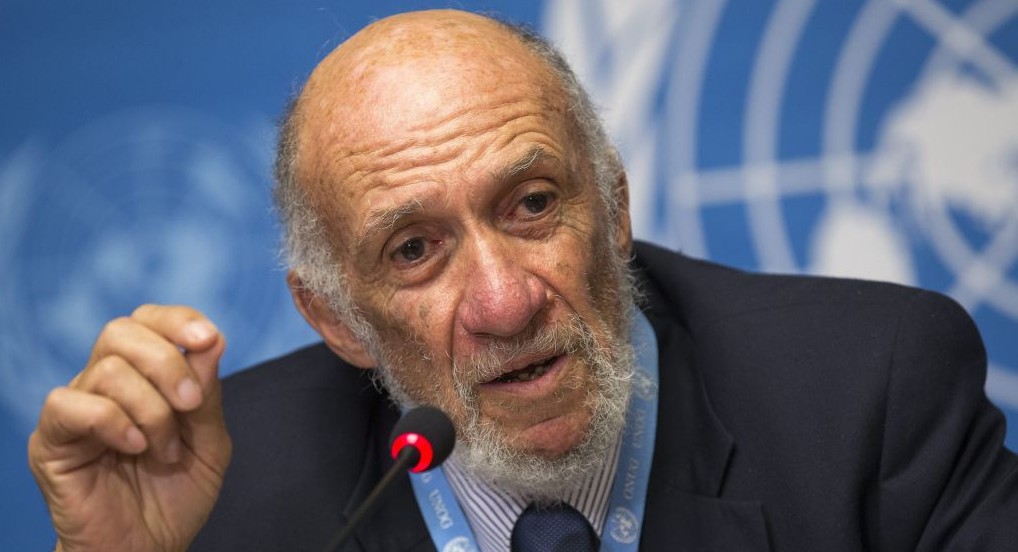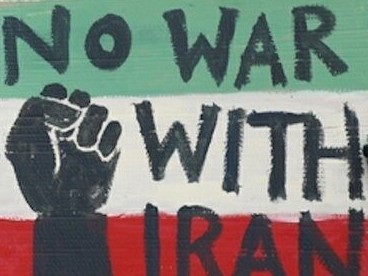Hear more from Richard A. Falk at CASI’s webinar on Feb. 1, 2021, “US-Iran Relations in the Biden Era: What’s Next?” Click here for more details or to register.

Interview with the Tehran Times
RICHARD A. FALK
[Prefatory Note: The challenge of transnational non-state violence is what the mainstream media dutifully criminalizes as ‘terrorism’ while whitewashing the abuses of state and state-sponsored violence as ‘counterterrorism’ or exercises of every state’s right to act in self-defense? Language matters as those who wanted to sugarcoat ‘torture’ by such phrases as ‘enhanced interrogation.’ The pendulum of U.S. foreign policy is swinging back in the direction of geopolitical confrontation, given the prospects of the Biden presidency. Although it is the highest political priority to be done with Trump and Trumpism, the renewal of ‘bipartisan foreign policy’ under the guidance of the American version of the deep state is not good news. It could mean a new cold war tilted toward China, but with different alignments, possibly including Russia, filled with risk and justification for continuing overinvestment in a militarized approach to national security causing a continuing underinvestment in human security, which exposes the main root cause of American imperial decline. A modified version of the post below addresses some of these issues, and was published in the Tehran Times (17 Dec 2020).]
- In 1972, a specialized Committee on Terrorism was set up at the United Nations, and member states made great efforts to provide appropriate definitions of international terrorism, but due to intense political differences, the actual definition of international terrorism and comprehensive conventions in practice was impossible. Security Council Resolution 1373 was the most serious attempt to define terrorism after 9/11, which evolved into UN Security Council Resolution 1535. Despite providing a definition of terrorism, countries approach it differently. What is the reason?
There exists a basic split between those political actors that seek to define ‘terrorism’ as anti-state violence by non-state actors and those actors that seek to define terrorism as violence directed at innocent civilians, regardless of the identity of the perpetrator. The latter approach to the definition reaches targeted or indiscriminate violence directed at civilians even if the state is the perpetrator. States that act beyond their borders to fulfill counterrevolutionary goals seek to stigmatize their adversaries as terrorists while exempting themselves from moral and legal accountability.
There exists a second basic split due to state practice following political rather than legal criteria when identifying terrorist actors. When the Taliban and Al Qaeda were opposing Soviet intervention in Afghanistan they were identified as Mujahideen, but when seen as turning against the West, they were put on the top of the terrorist list. Osama Bin Laden, once hailed as a Western ally deserving lavish CIA support became the most wanted terrorist after the 9/11 attacks on the World Trade Center and Pentagon. Such subjectivity and fluidity make it virtually impossible to develop a coherent and legal approach to ‘terrorist’ activity.
In essence, geopolitical actors have always sought to have international law regard the use of force by states acting on their own as falling outside the framework of terrorism while regarding transnational political violence by adversary or enemy non-state actors as terrorism even if the targeted person or organization is a government official or member of the armed forces, or if the non-state actor is resisting occupation by foreign armed forces. Before the 9/11 attacks Israel influentially adopted this approach in its effort to portray Palestinian resistance as a criminal enterprise. After 9/11 the United States added its political weight to this statist approach to the conception of terrorism, which meant in effect that any adversary target that could be characterized as associated with a non-state actor that resorted to armed struggle was criminalized to the extent of being treated as unprotected by international humanitarian law. In practice, this subjectivity was vividly displayed in recent years by support given to anti-Castro Cuban exiles that engaged in political violence against the legitimate Cuban government, and yet were given aid, support, and encouragement while based in the United States.
The UN was mobilized after the 9/11 attacks by the United State to support this statist/geopolitical approach to political violence, which possessed these elements, and given formal expression in a series of Security Council Resolutions, including 1373, 1535:
–terrorists are individuals who engage in political violence on behalf of non-state actors;
–states, their officials and citizens may be guilty of supporting such activities through money, weapons and safe haven, and therefore indictable under national and international law as aiding and abetting terrorism;
–political violence by states, no matter what its character, is to be treated by reference to international law, including international humanitarian law, and not viewed as terrorism;
–even if the non-state actor is exercising its right of resistance under international law against colonialism or apartheid, its political violence will be treated as ‘terrorism’ if such a designation furthers geopolitical ambitions.
The alternative view of terrorism that I endorse emphasizes the nature of the political violence, rather than the identity of the perpetrator. As such, political violence can be identified as ‘state terrorism,’ which amounts to uses of force that are outside the framework of war and peace, and violate the sovereign rights of a foreign country or fundamental rights of citizens within the territory of the state. Such acts of terrorism may be clandestine or overt, and may be attributed to state actors when counterrevolutionary groups are authorized, funded, and encouraged directly or indirectly by the state. Non-state actors can also be guilty of terrorism if their tactics and practices deliberately target civilians or recklessly disregard risks of death or harm to civilians.
- How do you assess the role and position of Iran in the fight against terrorism in the region?
As far as I know, Iran has opposed non-state political violence of groups such as ISIS or Taliban that engage in terrorist activity by committing atrocities against civilians that amount to Crimes Against Humanity. Iran has also consistently condemned state terrorism of the sort practiced by Israel and the United States, and possibly other governments, within the region. In this regard, Iran has been active both in the struggle against non-state and state terrorism.
Iran has been accused of lending funding and material support to non-state actors that many governments in the West officially classify as ‘terrorist’ organizations, such as Hezbollah and Hamas. Part of the justification for U.S. sanctions arises from this allegation that Iran supports terrorism in the Middle East. These allegations are highly ‘political’ in character as both Hezbollah and Hamas engaged in violent resistance directed at unlawful occupation policies that denied basic national rights to the Lebanese and Palestinian people, including the fundamental right of self-determination, although some of their tactics and acts may have crossed the line of legality.
There are also contentions that Iran’s support for the Syrian government in dealing with its domestic adversaries involves complicity in behavior that violates the laws of war and international humanitarian law. This contention is a matter of regional geopolitics. As far as international law is concerned, the Assad government in Damascus is the legitimate representative of the Syrian people, and is treated as such at the UN. Iran is legally entitled to provide assistance to such a government faced with insurgent challenges from within its boundaries. If the allegations are true that Syria has bombed hospitals and other civilian sites, then the Syrian government could be charged with state terrorism.
3- How do you assess the role and position of General Qassam Soleimani in the fight against terrorism and ISIS in the region?
Although a military officer, General Soleimani, was not in any combat role when assassinated, and was engaged in peacemaking diplomacy on a mission to Iraq at the invitation of the Prime minister. His assassination was a flagrant instance of state terrorism. With considerable irony, General Soleimani had been playing a leading counterterrorist role throughout the region, and was widely appreciated outside of Iran. He is thought to have been primarily responsible for the ending, or at least greatly weakening, the threat posed by ISIS to the security of many countries in the Middle East.
It is true that Gen. Soleimani assisted resistance forces in Iraq that sought to induce the departure of American armed forces and an end to the occupation of the country. In this role American troops were killed and wounded by roadside bombs and other tactics of resistance.
- Given the conflict of interests of different countries, can we see the same action by countries against terrorism? What mechanism can equalize the performance of countries against terrorism?
As suggested at the outset, without a widely adopted and generally agreed upon definition of terrorism it is almost impossible to create effective international mechanisms to contain terrorism-from-below. As matters now stand, the identification of ‘terrorists’ and ‘terrorism’ is predominantly a matter of geopolitical alignment rather than the implementation of prohibitions directed at unacceptable forms of political violence within boundaries and across borders. Even more serious is the exclusion of all state forms of political violence from international definitions of terrorism.
To imagine the emergence of effective international, or regional, mechanisms to combat terrorism at least four developments would have to occur:
–the reliance on legal criteria to categorize political violence as terrorism if civilians and protected sites (hospitals, churches) are targeted;
–the inclusion of ‘state terrorism’ and ‘state sponsored terrorism’ in the official definition of terrorism;
–the inclusion of political violence within sovereign territory as well as across boundaries;
–an internationally or regionally agreed definition incorporating these three elements and formally accepted by all major sovereign states and by the United Nation.
In the present international atmosphere, such an international consensus is impossible to achieve. The United States and Israel, and a series of other important states would never agree. There are two sets of obstacles: some states would not give up their discretion to attack civilian targets outside their borders and would not accept accountability procedures that impose limits on their discretion over the means used to deal with domestic transnational non-state adversaries.
Under these conditions of geopolitical subjectivity such that from some perspectives non-state actors are ‘freedom-fighters’ and from others they are ‘terrorists,’ no common grounds for meaningful, consistent, and trustworthy intergovernmental arrangements exist.
It remains important for individuals and legal experts to advocate a cooperative approach to the prevention and punishment of terrorists and terrorism by reference to an inclusive definition of terrorism that considers political violence by states and by governments within their national territory as covered.
It would also make sense to include non-state actors as stakeholders in any lawmaking process that has any prospect of achieving both widespread acceptance as a framework and implementation at behavioral levels. It would seem, in this regard, important to prohibit torture of terrorist suspects or denial of prisoner of war rights to non-state combatants. One-sided legal regimes tend to be rationalizations for unlawful conduct, and thus operate as political instruments of conflict rather than legal means of regulation.
Unless surprises occur, almost a probability, the Biden foreign policy will likely follow the George W. Bush approach more than the Obama approach, which continued to unfold as part of the aftermath to the 9/11 attacks. This means becoming again captive to the deep state’s approach to world order: global militarism, Euro-centric points of reference, predatory capitalism, and quasi-confrontational toward China, Russia. Such an outlook could produce a new cold war, and would certainly create political support for continuing over-investment in global militarism.
